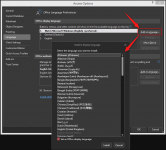I remember years ago helping a Greek Access user with a similar problem where the first character of the Greek word for month (μήνας) had to be used. Also note that localities where the comma is the regional decimal separator often use semicolons for separating parameters in functions.
Consequently it would suggest that it is necessary that code written in a locality needs to be compiled in that locality too.
The details of the date separator is also need to be understood. The forward slash used as the date separator in the date Format string is not a literal forward slash but a placeholder for the local date separator. Regions with a different date separator such as a dash will substitute that instead and cause problems for the SQL.
The format string for international use should either be "#yyyy-mm-dd#" or "#mm\/dd\/yyyy#". The backslash specifies the next character is literal, rather than the regional date separator.
To add potential confusion, Windows (not just VBA or ACE) will attempt to interpret a date any way that works. Consequently a date Formatted with an unexpected separator in a another region might be wrongly interpreted but get past testing.
My favorite dates are those like 29/2/22 which Windows will quietly interpret as 2029-02-22 since 2022 is not a leap year.
Consequently it would suggest that it is necessary that code written in a locality needs to be compiled in that locality too.
The details of the date separator is also need to be understood. The forward slash used as the date separator in the date Format string is not a literal forward slash but a placeholder for the local date separator. Regions with a different date separator such as a dash will substitute that instead and cause problems for the SQL.
The format string for international use should either be "#yyyy-mm-dd#" or "#mm\/dd\/yyyy#". The backslash specifies the next character is literal, rather than the regional date separator.
To add potential confusion, Windows (not just VBA or ACE) will attempt to interpret a date any way that works. Consequently a date Formatted with an unexpected separator in a another region might be wrongly interpreted but get past testing.
My favorite dates are those like 29/2/22 which Windows will quietly interpret as 2029-02-22 since 2022 is not a leap year.

